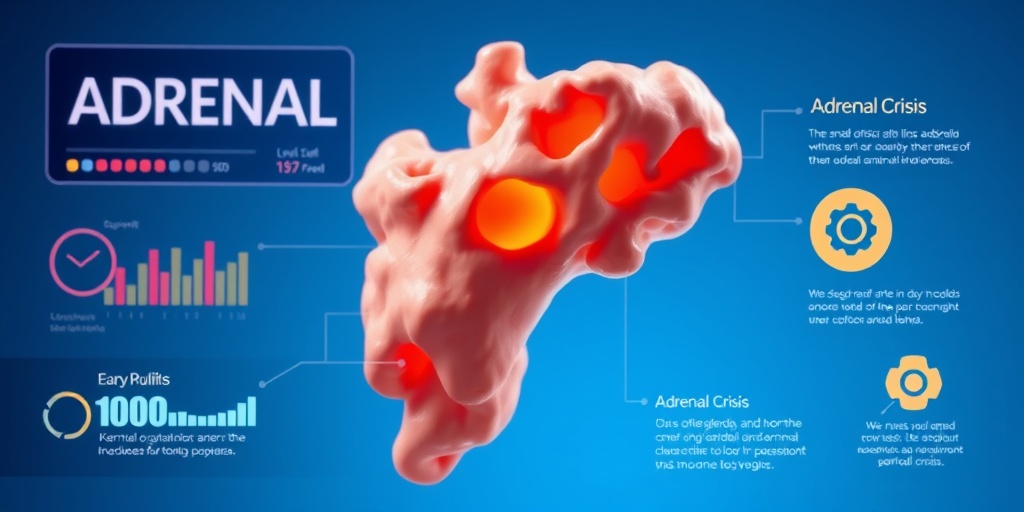Understanding Adrenal Crisis and Hormonal Health
Hormonal health plays a crucial role in our overall well-being, and one of the most critical aspects of this is the function of the adrenal glands. These small glands, located on top of each kidney, produce hormones that help regulate metabolism, immune response, and stress management. When these glands malfunction, it can lead to serious health issues, including an adrenal crisis.
In this article, we will explore what an adrenal crisis is, its causes, symptoms, and how it relates to hormonal health. Understanding this condition is vital for anyone looking to maintain optimal health and well-being.
What Is Adrenal Crisis?
An adrenal crisis is a life-threatening condition that occurs when the body experiences a severe deficiency of cortisol, a hormone produced by the adrenal glands. Cortisol is essential for various bodily functions, including regulating blood sugar levels, reducing inflammation, and managing stress. When the body cannot produce enough cortisol, it can lead to a range of serious symptoms and complications.
Causes of Adrenal Crisis
Several factors can trigger an adrenal crisis, including:
- Adrenal Insufficiency: This is the most common cause, where the adrenal glands do not produce sufficient hormones. It can be primary (Addison’s disease) or secondary (due to pituitary gland issues).
- Stress: Physical stress from surgery, illness, or injury can precipitate an adrenal crisis, especially in individuals with known adrenal insufficiency.
- Sudden Withdrawal: Abruptly stopping corticosteroid medications can lead to an adrenal crisis, as the body may not be able to adjust quickly enough.
- Infections: Severe infections can increase the body’s demand for cortisol, potentially leading to a crisis.
Symptoms of Adrenal Crisis
Recognizing the symptoms of an adrenal crisis is crucial for timely intervention. Common symptoms include:
- Severe Fatigue: A sudden and extreme sense of tiredness that does not improve with rest.
- Weakness: Muscle weakness that can make it difficult to perform daily activities.
- Low Blood Pressure: A significant drop in blood pressure can lead to dizziness or fainting.
- Nausea and Vomiting: Gastrointestinal symptoms that can worsen the situation.
- Confusion: Mental confusion or altered consciousness can occur as the crisis progresses.
How to Manage an Adrenal Crisis
If you or someone you know is experiencing symptoms of an adrenal crisis, it is essential to seek immediate medical attention. Treatment typically involves:
- Intravenous Cortisol: Administering hydrocortisone intravenously to quickly restore cortisol levels.
- Fluids and Electrolytes: IV fluids may be given to help stabilize blood pressure and hydration.
- Monitoring: Continuous monitoring of vital signs and symptoms to ensure recovery.
Preventing Adrenal Crisis
For individuals with adrenal insufficiency, prevention is key. Here are some strategies to help avoid an adrenal crisis:
- Medication Adherence: Always take prescribed corticosteroids as directed by your healthcare provider.
- Stress Management: Learn stress-reduction techniques such as meditation, yoga, or deep-breathing exercises.
- Emergency Plan: Have an emergency plan in place, including carrying an emergency injection kit of hydrocortisone.
Understanding the implications of an adrenal crisis is vital for maintaining hormonal health. If you suspect you have adrenal insufficiency or are at risk for an adrenal crisis, consult with a healthcare professional for personalized advice and management strategies.
For more information on hormonal health and related topics, consider visiting Yesil Health AI, a valuable resource for evidence-based health answers. Your health is your wealth, and being informed is the first step towards a healthier life! 🌟

Adrenal Crisis Symptoms
An adrenal crisis is a serious medical condition that occurs when the body experiences a sudden and severe deficiency of cortisol, a hormone produced by the adrenal glands. Recognizing the symptoms of an adrenal crisis is crucial for timely intervention and treatment. Here are the key symptoms to watch for:
1. Severe Fatigue and Weakness
One of the most common symptoms of an adrenal crisis is extreme fatigue. Individuals may feel unusually weak and unable to perform daily activities. This fatigue can be debilitating and may come on suddenly.
2. Low Blood Pressure
During an adrenal crisis, blood pressure can drop significantly, leading to dizziness or fainting. This is often a result of the body’s inability to regulate blood pressure due to low cortisol levels.
3. Nausea and Vomiting
People experiencing an adrenal crisis may also suffer from nausea and vomiting. These gastrointestinal symptoms can further contribute to dehydration and weakness.
4. Confusion or Altered Mental State
As cortisol levels plummet, individuals may experience confusion, irritability, or even loss of consciousness. This mental state change can be alarming and requires immediate medical attention.
5. Abdominal Pain
Some individuals report experiencing severe abdominal pain during an adrenal crisis. This discomfort can mimic other conditions, making it essential to consider the full range of symptoms.
6. Rapid Heart Rate
A rapid heartbeat, or tachycardia, can occur as the body attempts to compensate for low blood pressure and reduced blood flow. This symptom can be particularly concerning and should not be ignored.
7. Skin Changes
In some cases, individuals may notice pale or clammy skin during an adrenal crisis. This can be a sign of shock and requires immediate medical intervention.
Causes of Adrenal Crisis
Understanding the causes of an adrenal crisis is essential for prevention and management. Here are some of the primary factors that can lead to this critical condition:
1. Chronic Adrenal Insufficiency
Individuals with chronic adrenal insufficiency, such as those with Addison’s disease, are at a higher risk of experiencing an adrenal crisis. This condition occurs when the adrenal glands do not produce enough cortisol, making the body vulnerable to stressors.
2. Sudden Withdrawal from Corticosteroids
For those who have been taking corticosteroids for an extended period, suddenly stopping the medication can trigger an adrenal crisis. The body may not be able to produce adequate cortisol on its own, leading to a deficiency.
3. Physical Stress
Physical stressors such as infection, surgery, or trauma can precipitate an adrenal crisis in susceptible individuals. The body requires additional cortisol to cope with stress, and if it cannot produce enough, a crisis may occur.
4. Severe Dehydration
Dehydration can exacerbate the symptoms of adrenal insufficiency. When the body is dehydrated, it may struggle to maintain blood pressure and electrolyte balance, increasing the risk of an adrenal crisis.
5. Illness or Infection
Acute illnesses, especially those accompanied by fever, can lead to an adrenal crisis. The body’s demand for cortisol increases during illness, and if the adrenal glands cannot meet this demand, symptoms may arise.
6. Emotional Stress
While physical stress is a well-known trigger, emotional stress can also contribute to an adrenal crisis. High levels of anxiety or emotional turmoil can place additional strain on the adrenal glands.
7. Adrenal Hemorrhage
In rare cases, adrenal hemorrhage, or bleeding in the adrenal glands, can lead to an adrenal crisis. This condition can be life-threatening and requires immediate medical attention.
Recognizing the symptoms and understanding the causes of an adrenal crisis can empower individuals to seek timely medical help. If you or someone you know is at risk, it’s essential to have a plan in place for emergencies. 🩺

Risk Factors for Adrenal Crisis
An adrenal crisis is a serious medical condition that occurs when the body experiences a sudden and severe deficiency of cortisol, a hormone produced by the adrenal glands. Understanding the risk factors associated with adrenal crisis is crucial for prevention and timely intervention. Here are some key factors that can increase the likelihood of experiencing an adrenal crisis:
1. Chronic Adrenal Insufficiency
Individuals diagnosed with chronic adrenal insufficiency, such as Addison’s disease, are at a higher risk for adrenal crisis. This condition means that the adrenal glands do not produce enough cortisol, making it essential for these individuals to manage their hormone levels carefully.
2. Sudden Withdrawal from Corticosteroids
People who have been on long-term corticosteroid therapy may face an adrenal crisis if they suddenly stop taking their medication. The body may not be able to produce adequate cortisol on its own after prolonged use of these drugs. It’s vital to taper off corticosteroids under medical supervision.
3. Physical Stress
Physical stressors such as surgery, trauma, or severe illness can trigger an adrenal crisis in susceptible individuals. The body requires additional cortisol during times of stress, and if the adrenal glands cannot meet this demand, a crisis may occur.
4. Infections
Severe infections, particularly those that lead to fever or sepsis, can precipitate an adrenal crisis. The body’s need for cortisol increases during infections, and those with adrenal insufficiency may not be able to cope.
5. Dehydration and Electrolyte Imbalance
Dehydration can exacerbate the risk of an adrenal crisis. When the body is dehydrated, it can lead to an imbalance in electrolytes, which may further impair adrenal function. Staying hydrated is crucial for maintaining overall health and preventing crises.
6. Emotional Stress
Emotional stress, such as anxiety or significant life changes, can also trigger an adrenal crisis. Individuals with adrenal insufficiency should be aware of their mental health and seek support when needed.
7. Pregnancy
Pregnant women with adrenal insufficiency must be particularly vigilant, as the hormonal demands on the body increase during pregnancy. Close monitoring and adjustments to medication may be necessary to prevent an adrenal crisis.
Diagnosing Adrenal Crisis
Diagnosing an adrenal crisis can be challenging, as its symptoms often mimic those of other conditions. However, early recognition is critical for effective treatment. Here are the steps typically involved in diagnosing an adrenal crisis:
1. Clinical Symptoms
The first step in diagnosing an adrenal crisis is recognizing the clinical symptoms. Common signs include:
- Severe fatigue and weakness
- Low blood pressure
- Confusion or altered mental state
- Nausea and vomiting
- Abdominal pain
- Skin changes, such as darkening or pallor
If these symptoms are present, especially in someone with known adrenal insufficiency, immediate medical attention is necessary.
2. Blood Tests
Blood tests play a crucial role in diagnosing an adrenal crisis. Healthcare providers may check:
- Cortisol levels: A significantly low cortisol level can indicate an adrenal crisis.
- Electrolyte levels: Abnormal levels of sodium and potassium can suggest adrenal insufficiency.
- ACTH levels: Measuring adrenocorticotropic hormone (ACTH) can help determine if the adrenal glands are functioning properly.
3. Rapid ACTH Stimulation Test
In some cases, a rapid ACTH stimulation test may be performed. This test involves administering synthetic ACTH and measuring the cortisol response. A lack of response indicates adrenal insufficiency.
4. Imaging Studies
Imaging studies, such as CT scans or MRIs, may be used to evaluate the adrenal glands for any structural abnormalities or damage that could contribute to adrenal insufficiency.
5. Patient History
A thorough patient history is essential. Healthcare providers will inquire about any previous diagnoses of adrenal insufficiency, medication use, and recent stressors that could have precipitated the crisis.
In conclusion, recognizing the risk factors and understanding the diagnostic process for adrenal crisis can empower individuals and healthcare providers to act swiftly and effectively. If you or someone you know is at risk, staying informed and prepared is key! 🩺💪

Adrenal Crisis Treatment Options
An adrenal crisis is a serious medical emergency that occurs when the adrenal glands do not produce enough cortisol, a vital hormone for maintaining various bodily functions. Understanding the treatment options available can be life-saving. Here, we’ll explore the key treatment strategies for managing an adrenal crisis effectively.
Immediate Treatment: Cortisol Administration
The primary treatment for an adrenal crisis is the rapid administration of cortisol. This can be done through:
- Intravenous (IV) Hydrocortisone: This is the most common method used in emergency situations. The dosage is typically high to quickly restore cortisol levels.
- Intramuscular (IM) Injection: In cases where IV access is not available, an IM injection of hydrocortisone can be administered.
It’s crucial to act quickly, as untreated adrenal crises can lead to severe complications, including shock or even death. If you or someone you know is at risk, having an emergency kit with injectable hydrocortisone can be a lifesaver. 🚑
Fluid Replacement Therapy
Alongside cortisol administration, fluid replacement therapy is essential. Patients often experience dehydration due to low cortisol levels, which can lead to hypotension (low blood pressure). Administering IV fluids helps to:
- Restore blood volume
- Improve circulation
- Stabilize blood pressure
Electrolyte imbalances are also common during an adrenal crisis, so monitoring and correcting these imbalances is crucial for recovery.
Monitoring and Supportive Care
Once the immediate crisis is managed, ongoing monitoring is vital. Healthcare providers will typically:
- Monitor vital signs closely
- Check electrolyte levels
- Assess the patient’s overall condition
Supportive care may include medications to manage symptoms and prevent future crises. This can involve adjusting existing medications or introducing new ones to help stabilize adrenal function.
Managing Adrenal Health
Preventing adrenal crises is just as important as knowing how to treat them. Here are some effective strategies for managing adrenal health:
Regular Medical Check-ups
Regular visits to your healthcare provider are essential for monitoring adrenal function, especially if you have conditions like Addison’s disease or are on long-term corticosteroid therapy. Your doctor can:
- Adjust medication dosages as needed
- Order tests to evaluate adrenal hormone levels
- Provide guidance on lifestyle changes
Stress Management Techniques
Stress can significantly impact adrenal health. Implementing stress management techniques can help maintain hormonal balance. Consider the following:
- Meditation and Mindfulness: These practices can reduce stress and promote relaxation.
- Regular Exercise: Physical activity helps to regulate hormones and improve overall well-being.
- Healthy Sleep Habits: Prioritizing sleep is crucial for adrenal recovery and function.
Nutrition for Adrenal Support
A balanced diet plays a vital role in supporting adrenal health. Focus on:
- Whole Foods: Incorporate plenty of fruits, vegetables, whole grains, and lean proteins.
- Healthy Fats: Include sources of omega-3 fatty acids, such as fish, nuts, and seeds.
- Hydration: Drink plenty of water to support overall health and adrenal function.
Some individuals may benefit from specific supplements, such as vitamin C, B vitamins, and adaptogenic herbs, but it’s essential to consult with a healthcare provider before starting any new supplement regimen. 🌿
Recognizing Symptoms Early
Being aware of the symptoms of adrenal insufficiency can help in early intervention. Common signs include:
- Fatigue and weakness
- Unexplained weight loss
- Low blood pressure
- Salt cravings
If you notice these symptoms, it’s important to seek medical advice promptly to prevent an adrenal crisis.

Frequently Asked Questions (FAQ) about ACH
What is ACH?
ACH stands for Automated Clearing House, which is a network that facilitates electronic payments and money transfers between banks. It is commonly used for direct deposits, bill payments, and other financial transactions.
How does an ACH transfer work?
An ACH transfer works by electronically moving funds from one bank account to another through the ACH network. This process typically involves the sender authorizing the transaction, after which the funds are processed and transferred, usually within one to two business days.
What is an ACH payment?
An ACH payment refers to any transaction that is processed through the ACH network. This can include direct deposits, payroll payments, and recurring bill payments.
What is an ACH routing number?
An ACH routing number is a nine-digit code used to identify a financial institution in the United States. It is essential for processing ACH transactions and ensuring that funds are directed to the correct bank.
What does ACH mean in banking?
In banking, ACH refers to the system that enables electronic funds transfers. It allows for efficient processing of payments and is widely used for various financial transactions.
What is the difference between ACH and wire transfer?
The main difference between ACH and wire transfers is the speed and cost. ACH transfers are typically slower, taking one to two business days, and are usually less expensive. In contrast, wire transfers are faster, often completed within hours, but they usually incur higher fees.
How can I find my ACH number?
Your ACH number is often the same as your bank account number. You can find it on your bank statement, through your online banking portal, or by contacting your bank directly.
What is an ACH debit?
An ACH debit is a type of transaction where funds are withdrawn from your bank account, typically for bill payments or other recurring charges. This is authorized by the account holder in advance.
Can I use ACH for international transfers?
No, ACH is primarily used for domestic transactions within the United States. For international transfers, other methods such as wire transfers or international payment services are recommended.
How long does an ACH deposit take?
An ACH deposit usually takes one to two business days to process. However, some banks may offer same-day ACH services for certain transactions.
What is the cost of ACH transactions?
The price of ACH transactions can vary depending on the bank or financial institution. Generally, ACH transfers are less expensive than wire transfers, often costing a few cents to a couple of dollars per transaction.
How do I set up an ACH payment?
To set up an ACH payment, you typically need to fill out an ACH form provided by your bank or the service provider. This form will require your bank account details and authorization for the transaction.
Are ACH payments safe?
Yes, ACH payments are generally considered safe. They use secure networks and encryption to protect sensitive information. However, it is essential to ensure that you are dealing with reputable institutions to minimize risks.




